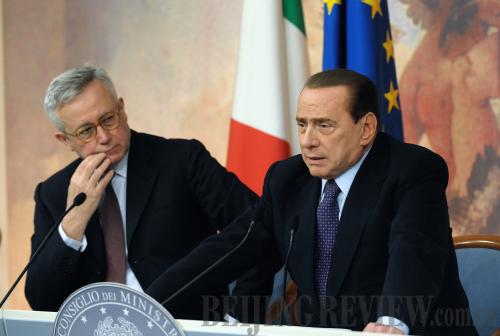|
 |
|
TIGHTENING THE BELTS: Italian Prime Minister Silvio Berlusconi (right) attends a press conference in Rome on August 12, along with Giulio Tremonti, Italian Economy and Finance Minister, after a cabinet meeting. At the meeting, the Italian Government adopted an austerity package worth 45.5 billion euros ($65.4 billion) (WANG QINGQIN) |
China is now the EU's second largest trading partner behind the United States and the EU's biggest source of imports by far. The EU is China's top export destination, and stabilizing the euro zone is clearly in the interest of the symbiotic relationship between European and Chinese economies. China is not a large investor in EU member states, and there is indeed much space for greater investment. In 2010, the Chinese mainland made up only 0.3 percent of foreign direct investment flows into the EU's 27 countries, up from 0.1 percent in 2009, while the United States made up 28.5 percent. Buying euro-denominated bonds also allows China to diversify away from the United States.
Trade and investment deals might open more avenues to address the EU's trade deficit with China, which has long been a point of contention between the two sides. Significantly, China's public support of the euro zone reflects its long-term commitment to its relationship with the EU and its sincere desire to foster stronger interdependence and, by extension, greater convergence of interests and goodwill, which might have a positive spillover effect on other facets of Sino-EU relations.
With the world's largest foreign-currency reserves, China is increasingly seen as a possible source of capital by debt-ridden countries. In addition to its pledge to buy Hungarian debt, China has extended a 1-billion-euro loan ($1.4 billion) to Hungary, promised to buy up to 5 billion euros ($7.2 billion) of Portuguese sovereign bonds and is believed to have committed to buying about 6 billion euros ($8.6 billion) of Spanish debt.
Win-win outcomes
While the vocal and monetary support extended by China has been generally well received by EU member states, there are fears China might be making a strategic attempt to push up the euro exchange rate against the yuan in the process or pursuing leverage to seek EU recognition of its market economy status. In January this year, President of the European Council Herman Van Rompuy said, "When they buy euros, the euro becomes stronger and their currency a little bit weaker. That is not neutral in regard to their competitive position."
Such a line of thought, while understandable, is clearly not constructive. While there might be many conceivable reasons for China's extension of a helping hand, no country can be expected to be entirely altruistic when it comes to critical investment decisions regarding its reserves, and China's pursuit of a win-win outcome with the EU is evident. China's central bank has expressed its strong intention to go beyond symptomatic relief of the crisis through debt purchase and address the underlying causes of global economic problems. The bank hopes to explore ways in which Chinese and European financial institutions can strengthen cooperation to increase capital strength, improve the risk-sharing system, and possibly develop financial and hedging instruments that meet the needs of both Chinese and European markets.
With several European countries facing serious solvency problems, to preempt the problem of default and lessen the debt burden, the EU has taken to reducing interest rates and extending the maturity periods of loans. The EU might also pursue unconventional monetary policy measures to solve the debt crisis. While China has repeatedly expressed its confidence in European financial markets and its belief the EU will overcome the current crisis, it has also asserted the necessity of political will and responsible actions.
The EU and the United States are China's two largest trading partners, and their longstanding economic problems would inevitably lead to a slowdown in China's economic growth. As evident from China's critique of the handling of the U.S. debt crisis following an unprecedented downgrade by credit rating agency Standard & Poor's, China expects the EU to take concrete measures to resolve its mounting debt problem and make difficult but necessary decisions regarding structural problems in the euro zone.
The EU makes up approximately 20 percent of global GDP, and a European economy mired in uncertainty and debt will have worldwide economic repercussions. More importantly, the crisis has uncovered the underlying weaknesses of the euro zone and provided the much-needed impetus for strengthening coordination and control, the results of which will certainly pay off in the years to come.
The author is an associate fellow with Chatham House, London |
